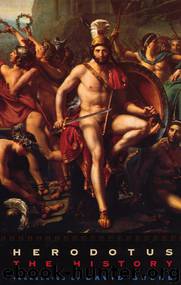The History by Herodotus; Grene David

Author:Herodotus; Grene, David
Language: eng
Format: epub
Publisher: The University of Chicago Press
* * *
1. See 1.15–16 and 103.
2. This is, if a minor difficulty of interpretation as far as importance goes, one of the most insoluble. Clearly, Herodotus is making a connection between the Scythians' total dependence on their horses for not only transport but milk (“kumiss,” as it is called in Tolstoy, who applied the term to mare's milk of this very region). Their slaves do not need to work the fields, ploughing, etc. They are used for producing dairy products. (I take it that the curious stimulation of the mares' udders is to be the work of the Scythians themselves, who would need to be very far from blind for this work.) I suppose that, to keep the slaves at the dull job of incessantly “churning” the milk, it would be useful to have them deprived of sight—to hinder their moving about like ordinary mortals. This, however, is only a guess. No editor has any definitive answer to the difficulties.
3. The modern Sea of Azov.
4. The Dnieper.
5. Apparently “Skoloti” is some approximation of, or a pet name for, Colaxaïs.
6. Tolstoy builds a story around just such a custom among the Baskirs, who may have lived in the territory described by Herodotus; but in his story the man must walk to gain his land, for the space of a day. The story is called “How Much Land Does a Man Need?”
7. Herodotus explains the feathers in chapter 31.
8. Quite a bit west! From somewhere near southwest Russia to Spain; for the Pontus is the Black Sea, the Pillars of Heracles are the Straits of Gibraltar, and Gadira is Cadiz.
9. At 3.115 Herodotus also denies that he can find evidence for “a sea beyond Europe.”
10. This refers to the Ukraine, which then, as for so long later, was the great source of the grain that was imported by Greece and by Europe generally. It is clear that Herodotus is far more used to the idea of people who grow grain for their bread and would market only such surplus as they had—i.e., a subsistence system of grain-farming. Such were the Callippidae, Alazones, etc.; but when one gets to the big open country of the Ukraine, the grain fields as the source of export and mass marketing take over.
11. The Hypanis river is the Bug; the Borysthenes is the Dnieper.
12. The Greek word here means “dwellers in the Blessed City,” i.e., the big grain port of Olbia.
13. The name Cremnoi can be translated as The Cliffs.
14. The Don.
15. Herodotus means that there are neither native forests nor cultivated olive groves.
16. The editors connect this with a Cossack drink called atschi. The tree is a variety of cherry.
17. The general Greek word for sheep and goats.
18. The bald people of the earlier chapter have now acquired Baldies as a national name.
19. Apollo and Artemis, twin children of Leto, were born on the island of Delos, which was sacred to Apollo and one of the most important centers of his worship. Eileithyia is the goddess of childbirth.
Download
This site does not store any files on its server. We only index and link to content provided by other sites. Please contact the content providers to delete copyright contents if any and email us, we'll remove relevant links or contents immediately.
4 3 2 1: A Novel by Paul Auster(11788)
The handmaid's tale by Margaret Atwood(7447)
Giovanni's Room by James Baldwin(6808)
Asking the Right Questions: A Guide to Critical Thinking by M. Neil Browne & Stuart M. Keeley(5355)
Big Magic: Creative Living Beyond Fear by Elizabeth Gilbert(5351)
Ego Is the Enemy by Ryan Holiday(4956)
On Writing A Memoir of the Craft by Stephen King(4661)
The Body: A Guide for Occupants by Bill Bryson(4580)
Ken Follett - World without end by Ken Follett(4443)
Bluets by Maggie Nelson(4260)
Adulting by Kelly Williams Brown(4232)
Eat That Frog! by Brian Tracy(4148)
Guilty Pleasures by Laurell K Hamilton(4116)
White Noise - A Novel by Don DeLillo(3829)
The Poetry of Pablo Neruda by Pablo Neruda(3813)
Fingerprints of the Gods by Graham Hancock(3733)
Alive: The Story of the Andes Survivors by Piers Paul Read(3729)
The Book of Joy by Dalai Lama(3695)
The Bookshop by Penelope Fitzgerald(3618)
